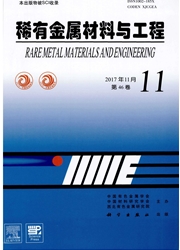

 中文摘要:
中文摘要:
近等原子比TiNi形状记忆合金(SMAs)作为植入体具有良好的生物医学应用价值,但合金的腐蚀会产生一些不利影响,同时Ni^+析出会引起细胞和组织的过敏、中毒等反应。因此,TiNi SMAs的生物安全性及其表面改性方法被诸多学者研究。本文就TiNi SMAs表面改性技术进行了综合阐述,并提出未来发展的可能性。目前等离子体注入及沉积复合处理,氧化处理,羟基磷灰石等涂层技术,TiO2纳米管表面改性方法等能够提高TiNi SMAs的耐蚀及生物相容性。未来纳米技术和生物技术相结合可能创造具有科学和应用价值的新材料。
 英文摘要:
英文摘要:
There are a number of biomedicine applications for TiNi shape memory alloys(SMAs) with nearly atomic ratio as implants, but their corrosion may cause some adverse effects and release of Ni-+ can result in allergies and poisoning reactions of cells and tissues. So their biosecurity and surface modification technology have been researched by many researchers. The preparation and surface modification methods of TiNi SMAs were stated in this paper, and the possibility of the future development was put forward. Now the methods including plasma immersion ion implantation and deposition combined treatment, oxidation treatment, hydroxyapatite coating technology and TiO2 nanotube surface modification can improve corrosion resistance and biocompatibility of TiNi SMAs. The combination of nanotechnology and biotechnology can create new materials with the value of science and application.
 同期刊论文项目
同期刊论文项目
 同项目期刊论文
同项目期刊论文
 Improved oxidation resistance of the Zr-alloyed layer formed on 420 stainless steel by plasma surfac
Improved oxidation resistance of the Zr-alloyed layer formed on 420 stainless steel by plasma surfac 期刊信息
期刊信息
